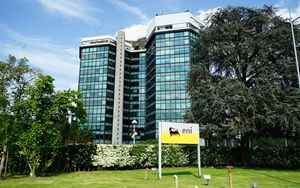(Finance) – Solenova, a joint venture between Eni and Sonangol aimed at the development of renewable energy projects, laid the foundation stone for the realization of the photovoltaic project of Caraculo, in the province of Namibe. It is the first solar plant in Angola.
The ceremony was attended by the Minister of Mineral Resources, Oil and Gas, Diamantino Azevedo, the Governor of the Province of Namibe, Archer Mangueira, the Chief Executive Officer of Solenova, Germano Sacavumbi, the Managing Director of Eni Angola, Adriano Mongini, the Directors of Sonangol, Baltazar Miguel and Jorge Vinhas and representatives of the Provincial Government of Namibe and the Ministry of Energy and Water, the Institute for the regulation of electricity and water services (IRSEA), the National Electricity Transmission Grid (RNT) , of the National Electricity Grid Company of Angola (ENDE), and of the shareholders Eni and Sonangol.
The Caraculo project involves the phased installation of a 50 MW photovoltaic system, with a first phase of 25 MW. Construction activities are led by Saipem and electricity will be fed into the grid in the southern territory of the country.
The project is located in an inhabited desert area and is respectful of the environment; it will contribute to the reduction of diesel consumption for electricity generation and will support the energy transition and diversification of the energy matrix in Angola, particularly in the southern region. In terms of environmental benefits in particular, the Caraculo photovoltaic plant will be able to avoid 50 KtCO2eq of climate-altering emissions per year.
The project is part of the objectives of “Angola Energy 2025”, the Angolan government’s long-term plan for the energy sector, the main objective of which is to provide the population with access to basic energy services. The plant will also contribute to the achievement of the objectives of the “Action Plan of the Energy and Water Sector 2018-2022” of the Government of Angola, which establishes in the medium term a goal of an additional 500MW of additional renewable energy (solar, wind, biomass and Mini-Hydro) by 2022, with a specific focus on industrial-scale solar projects. The project is also in line with the Sustainable Development Goal, SDG7 – Clean and accessible energy.
